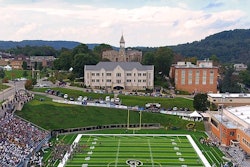Black LGBTQ+ youth face both racism and homophobia as a result of their intersectional identity. As a result, they also face hardships related to a number of facets in their lives, including school safety, religion, community support, and higher education, according to a new report from the Human Rights Campaign (HRC) Foundation. Charleigh J. Flohr
Charleigh J. Flohr
The "2024 Black LGBTQ+ Youth Report" – which the HRC Foundation created in partnership with the University of Connecticut – examines data from their 2022 survey of more than 12,000 LGBTQ+ teenagers, ages 13-17, and suggests ways in which parents and educators can help.
“Black LGBTQ+ youth need allyship, support and resources tailored to their Black LGBTQ+ identities,” said report co-author Charleigh Flohr, associate director of public education and research for the HRC Foundation. “Those two identities are not separate, and while information for LGBTQ+ people and Black people are important, the information and resources for people who live at the intersections of those two identities can look very different.”
For the purposes of the report, respondents who are transgender, non-binary, gender nonconforming, and other non-cisgender gender-expansive are referred to as transgender/gender-expansive youth.
“This report reinforces the unfortunate disposition of many Black LGBTQ+ students,” said Chauna C. Lawson, associate director for HRC’s HBCU Program. “They are challenged with navigating racism within LGBTQ+ spaces while simultaneously being met with homophobia and transphobia within the Black community.
“While the landscape of inclusion at HBCUs has improved significantly over the past 10-15 years, there is still far too much stigma around LGBTQ identities. These students find themselves targeted/alienated by faculty and staff just as much as by their peers, if not more so.”
In general, higher percentages of Black transgender/gender-expansive youth reported hardships than Black LGBTQ+ youth, in the realms of race, gender/sexuality, family, and school.




















